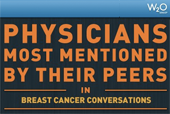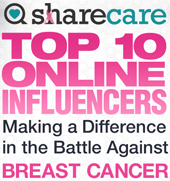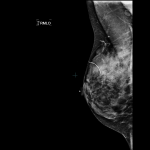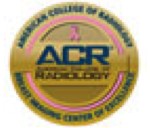Diagnosed with Breast Cancer as a New Mother, Sharon Shares her Story
 In 2003, my mom friend Sharon was relishing her role as a new mother in her early 40’s. She’d given birth to her daughter in 2001, and was now busy chasing after an adorable toddler, navigating naptimes, bottles and diapers, while working in the banking industry in Manhattan. Her husband and their brother-in-law had renovated and opened a beautiful new restaurant, and life was very exciting.
In 2003, my mom friend Sharon was relishing her role as a new mother in her early 40’s. She’d given birth to her daughter in 2001, and was now busy chasing after an adorable toddler, navigating naptimes, bottles and diapers, while working in the banking industry in Manhattan. Her husband and their brother-in-law had renovated and opened a beautiful new restaurant, and life was very exciting.
The Symptom Leading to Diagnosis
Sharon had gone for yearly mammograms since turning 40, and the test had always been reported as normal. She had no family history of breast cancer, so the disease was not on the top of her list of things to worry about. Other cancers, however, had affected her family significantly; her father had died of stomach cancer, and her mother was in the late stages of colon cancer. Sharon had witnessed the suffering that cancer and its treatments could bring, and knew the pain of watching the disease claim the life of a beloved family member.
Over a few days’ time, Sharon noticed a new brownish left nipple discharge that was spontaneously leaving spots on her bra. She saw her gynecologist, who promptly sent her for a diagnostic mammogram. Sharon’s breast tissue was dense (see “What Breast Density Means to You”), and her mammogram was read as negative. A breast ultrasound (sonogram) was then performed, which found an abnormal spot. This was biopsied, and a diagnosis of DCIS (ductal carcinoma in situ, or Stage 0 breast cancer) was made. Shockingly, the doctor who had performed the biopsy left this information on Sharon’s voicemail.
Uneventful Treatment
Sharon decided to pursue treatment at Memorial-Sloan Kettering Cancer Center in Manhattan. She underwent a lumpectomy (surgical removal of a lump of tissue) and radiation therapy for a few weeks. Thankfully, no chemotherapy was necessary. She remembers that her oncologist helped to consolidate her radiation treatments over as few weeks as possible, as Sharon had so many important responsibilities: her child, her terminally ill mother in California, and her job. Luckily, Sharon’s cancer was small, caught early, and her prognosis was excellent.
Unexpected Recurrence Found With Breast MRI
For follow-up surveillance, Sharon’s doctors referred her for yearly mammograms as well as breast MRIs, a very sensitive test that is currently indicated for patients at high risk for breast cancer. In 2006 at age 47, three years after treatment for her original cancer, the MRI found something abnormal in her left breast. Again, her mammogram was dense and negative. An MRI-guided needle biopsy was performed, and the diagnosis was a new area of DCIS (stage 0 breast cancer). A lymph node under her arm was tested, and it was negative for cancer. At this point, Sharon decided to undergo a bilateral mastectomy with immediate reconstruction. She didn’t want to live with the risk of someday developing a more advanced cancer that could potentially kill her. On the pathology evaluation of the “healthy” right breast, atypical ductal hyperplasia (“pre-cancer”) was found. Sharon is certain she made the right decision for herself and her family. Today she is cancer-free and healthy, and her fabulous daughter is now 10 years old!
Takeaway Messages from Sharon
- On the controversial topic of the “overdiagnosis and overtreatment” of breast cancer: Some would argue that Sharon’s DCIS might not have progressed to a life-threatening cancer, and thus is an example of “overdiagnosis.” In addition, there would be some who would claim that Sharon’s decision to undergo a bilateral mastectomy (removal of both breasts) is an example of “overtreatment.” Sharon feels extremely fortunate that her cancer was found as early as it was, and because she had that diagnosis in 2003, she was monitored closely with MRI which found her recurrence as early as possible. She honestly couldn’t care less to know whether her cancer would have been one to progress to a life-threatening stage; knowing that her breast continued to make cancer, even after treatment, was enough for her to decide to have bilateral mastectomies. As to the issue of “overtreatment,” Sharon feels that she had the right to make that choice of treatment for herself; other women might have chosen differently, but for her, this was the right decision. She went through reconstruction, and she’s glad to not have the stress of periodic follow-up tests going forward. And she is extremely thankful that she never had to go through the misery of chemotherapy.
- Sharon hopes that women have started to understand the importance of breast density and the severe limits of mammography for women with dense breasts. Her relatives are now aware of the issue, and those who are dense insist that their doctors send them for second-level screening tests in addition to their annual mammograms (breast MRI or ultrasound).
- She found it helpful to undergo treatment at a multidisciplinary breast center, where her films and records were all in one place, and her multiple doctors were all on the same page.
- Sharon did not join a support group during her treatment, but she did find helpful information and support on the discussion boards online at www.breastcancer.org.
- One of the most stressful parts of Sharon’s experience with breast cancer was understanding her out-of-pocket costs, and keeping track of all of the medical bills, insurance statements and forms. She recommends keeping notes and setting up a filing system as early in the process as you can.
- If you have a friend with children who is undergoing cancer treatment and you want to offer concrete support, Sharon suggests that one of the most helpful things you can do is to keep her children happily occupied. Playdates, daytrips, a few hours in the park– anything that grants the mom a few hours to rest and heal, while her children are happy and safe.
Thank you for sharing your personal experiences with me, Sharon. I am so very thankful that your story serves as an example of the triumph of early detection.
Tags: breast cancer, breast cancer survivor, breast density, breast MRI, breast sonogram, early detection, government task force on mammograms, overdiagnosis of breast cancer, overtreatment of breast cancer










